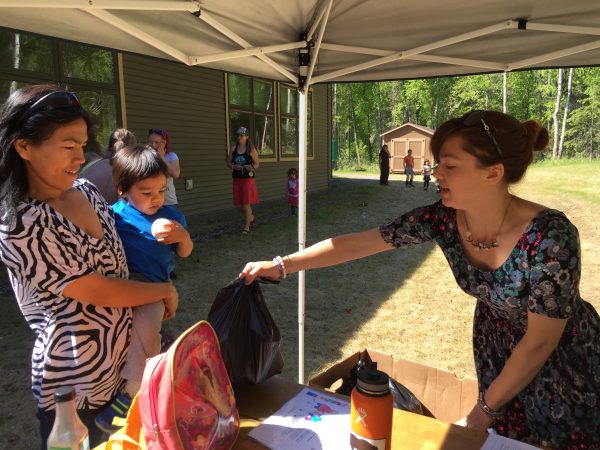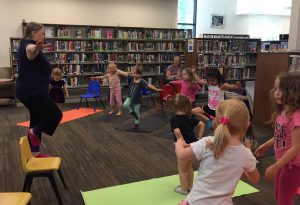
The Solutions Desk looks beyond Alaska’s problems and reports on its solutions – the people and programs working to make Alaska communities stronger. Listen to more solutions journalism stories and conversations, and share your own ideas here.
Five-year-old Mira Kidd was attempting the perilous adventure of trying new foods.
“It’s a cheese monster!” Mira screamed, holding a cheese stick dipped in red marinara sauce. “I’d better get away from that cheese monster before it bites me in the face!”
Sitting outside the Talkeetna Public Library on a sunny summer afternoon, Mira was participating in the federal Summer Meals Program, the library reading program and the new summer backpack program. There was a lot going on.
In Talkeetna, about 40% of the elementary school kids qualify for free or reduced lunch. That’s great for keeping bellies full during the school year, but not during breaks. The U.S. Department of Agriculture offers free summer meals, but they have to be served at a specific site, like a school or library.
Librarian Geri Denkewalter said when the library staff first learned about the USDA Summer Meals Program last year, they were excited to participate.
“If kids are hungry, you feed them,” Denkewalter said. “That’s what you do.”
It seemed like a natural fit in the close-knit small town. “The adults are used to bringing their children here because I read to them when they were children,” Denkewalter said.
So they tried it out, and it wasn’t that successful. Most kids only came to the library once a week for the summer reading program, and not every day for the meals.
Even the USDA reports the Summer Meals Program only reaches one in six children who qualify, and rural areas face the biggest challenges.
It was clear that the program wasn’t a good fit for Talkeetna, said Upper Susitna Food Pantry coordinator LouAnne Carroll-Tysdal.
“Here’s the problem: They can’t get to a site every day,” Carroll-Tysdal said. “There’s a lot of working poor here that can’t afford the gas.”
According to federal regulations, Carroll-Tysdal was not allowed to send the federal meals home with the kids, so she wrote a grant.
With about $7,600 from the Mat-Su Health Foundation, $1,000 from the Food Bank of Alaska and donated food from community members, Carroll-Tysdal started a backpack program. Instead of going to the library to eat just one meal, each child could also go home with 10 more.
“We pretty well stock the bags so that they have five lunch entrée items and then breakfast – oatmeal, cereal milk, lots of fruit, some veggies, some cheese dippers,” Carroll-Tysdal listed as she sorted through a stocked bag.
On shopping days, her pickup truck is filled to the brim with items purchased hours away at less expensive stores in Wasilla or Anchorage.
“Any store that has an item that I want in these lunches that goes on sale, I will go down and clean out their shelves,” Carroll-Tysdal said.
Since the program started, there has been a two-thirds increase in the number of kids participating in the library program. About 50 kids show up every week; last year it was fewer than 30. They eat lunch then do activities like planting trees or learning sign language. When they leave, the ones who need it have a bag of food for the week.
The idea is not new. There are backpack programs nationwide, but most only send food home for weekends. Research shows that the programs help entire families, and kids are more likely to attend school on Fridays when they receive their backpacks.

For parents like Jody Shook, who’s caring for seven kids from different families this summer, the Talkeetna backpack program is essential.
“If it wasn’t for this program we’d be shopping at Cubby’s and going broke feeding kiddos,” Shook said.
Cubby’s is the only grocery store near the small town, and it is about 14 miles up the main road.
Talkeetna is pretty spread out, which presents another problem for feeding kids in summer: not every parent can get their children to the library, even for the weekly program.
That’s where the next partner steps in – Sunshine Transit. On most days the small bus line just runs along the main roads but now, on Thursdays in summer, they go door-to-door to pick up kids. The bus takes them to and from the library for free.
“I am super excited about the lunch program,” Sarah Russell said; she met her kids as they got off the bus. “In the past, my kids have just been stuck at home. This gives them a chance to get out during the day.”
Sunshine Transit manager Kim Schlosser agreed to help the program even before she received extra funding to add the new service.
“I said to just tell me what you need and we’ll have the kids sign up ahead so we know where they live, and they know how many are coming, and let’s make this happen,” Schlosser said.
The bags of food were also available for kids who could not make it to the reading program. Parents could pick it up whenever the library was open.
Pantry coordinator Carroll-Tysdal said they have given out about 115 bags every week. That’s over 12,000 meals for the summer.
Want to hear more Solutions Desk stories? Subscribe to the podcast on iTunes, Stitcher, or NPR.
Anne Hillman is the healthy communities editor at Alaska Public Media and a host of Hometown, Alaska. Reach her at ahillman@alaskapublic.org. Read more about Anne here.





